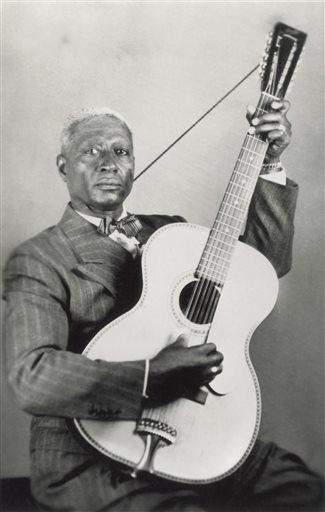
By CHARLES J. GANS
Huddie “Lead Belly” Ledbetter never had a hit record before he died of Lou Gehrig’s disease in 1949. But the folksinging legend, who is being celebrated next week as part of Black History Month by the Smithsonian with a TV documentary and 5-CD box set, left behind a treasure trove of recordings that yielded many hits for those who followed him.
Just months after his death, the folk group The Weavers, featuring his close friend Pete Seeger, hit No. 1 on the pop charts with his theme song “Good Night Irene,” which he first recorded in 1933 while an inmate at Louisiana’s notorious Angola State Prison by father-and-son musicologists John and Alan Lomax.
Among those inspired by Lead Belly was Lonnie Donegan, the founding father of British pop, who had a big hit with his sped-up version of “Rock Island Line.” Donegan inspired British teens to form skiffle groups, including 15-year-old John Lennon who founded The Quarrymen in 1956 and later added Paul McCartney and George Harrison to the band.
“George Harrison once said, ‘No Lead Belly, no Lonnie Donegan. Therefore no Lead Belly, no Beatles,'” said John Reynolds, author of “Lead Belly: A Life in Pictures.”
Reynolds is among the experts, family members and musicians interviewed in the documentary, “Legend of Lead Belly,” which premieres Monday at 8 p.m. EST on the Smithsonian Channel.
“It shows the far-reaching influence his music has all over the world,” said Reynolds. “There’s been nobody that has a repertoire quite like Lead Belly. He really knew about 500 songs and was like a human juke box. … He’s more relevant than ever. Jack White sings his songs, so did Kurt Cobain and some rappers like Wyclef Jean.”
The documentary features interviews with musicians inspired by Lead Belly, including Roger McGuinn (The Byrds), Eric Burdon (The Animals), Judy Collins and Van Morrison, who says the message of Lead Belly’s story is “survival … against all odds.”
For Lead Belly, the son of a Louisiana sharecropper, his music was a ticket out of the oppressive racism of the Jim Crow South — including doing hard labor for nearly 10 years in prisons in Texas for murdering a cousin in a fight over a woman and Louisiana for stabbing a white man in a fight — that eventually took him to the political folk music scene in New York with Woody Guthrie and Seeger.
The documentary is being aired on the eve of Tuesday’s release of “Lead Belly: The Smithsonian Folkways Collection,” the most comprehensive collection of recordings by the iconic artist. It spans his entire recording career from the Lomaxes’ 1933 prison recordings to his last 1948 sessions in the apartment of jazz scholar Fred Ramsey Jr.
The 108 tracks include 16 previously unreleased recordings — including radio programs from 1941 that feature his rarely recorded song intros. Among the discoveries is an original song, “Princess Elizabeth,” celebrating the marriage of the future British queen.
Producer Jeff Place hopes the collection enables people to look past the prison story the Lomaxes embellished to market Lead Belly — that he sang his way out of prison with pardon songs to the governors of Texas and Louisiana.
Instead, he wants people to focus on his musical contributions. Lead Belly was a powerful singer and a skilled guitarist. He picked up the rarely used 12-string Stella guitar because it was loud enough to be heard in noisy bars, his style influencing Seeger, McGuinn, Bonnie Raitt and Ry Cooder.
Place says Lead Belly was a “songster.” He played blues, spirituals, work and prison songs reflecting his life experience in the South. But his recordings also include cowboy songs, children’s rhymes, old British ballads, and topical songs he wrote about the Hindenburg and Titanic disasters.
Rather than being the “discovery” of folklorists, Lead Belly was a folklorist in his own right, said Place, senior archivist and curator of the Smithsonian folklife collections.
“He spent his whole life collecting an amazing assortment of songs in his travels, recording some of them so we have them now … He was like a human tape-recorder.”
___



